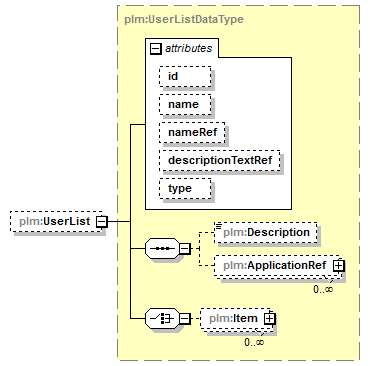| diagram |  |
||||||||||||||||||||||||||||||||||||||||||||||||||||||||||||||||||||||||||||||||||||||||||||||||
| namespace | http://www.plmxml.org/Schemas/PLMXMLSchema | ||||||||||||||||||||||||||||||||||||||||||||||||||||||||||||||||||||||||||||||||||||||||||||||||
| children | plm:UserList | ||||||||||||||||||||||||||||||||||||||||||||||||||||||||||||||||||||||||||||||||||||||||||||||||
| used by |
|
||||||||||||||||||||||||||||||||||||||||||||||||||||||||||||||||||||||||||||||||||||||||||||||||
| attributes |
|
||||||||||||||||||||||||||||||||||||||||||||||||||||||||||||||||||||||||||||||||||||||||||||||||
| annotation |
|
||||||||||||||||||||||||||||||||||||||||||||||||||||||||||||||||||||||||||||||||||||||||||||||||
| source | <xsd:complexType name="UserDataElementType"> <xsd:annotation> <xsd:appinfo source="http://www.plmxml.org/tools/CodeGenerator">sdkname=UserValue</xsd:appinfo> <xsd:documentation> This element defines a single title/value pair in a UserData table. Attributes: title: name of this entry in the table. value: value of the entry. type: datatype of the value, i.e. int, ints, etc, from UserValueDataType. format: format string as used by printf. editable: false if this value should not be modified by the receiving application. dataRef: If type is 'reference', dataRef specifies the referenced element. The value attribute is ignored. If type is 'enum' or 'list', then a UserList element should be specified either by dataRef, or by being included as a sub-element. In the 'enum' case, the UserList gives the valid values of the enum; in the 'list' case, 'value' is ignored and the UserList IS the value of this entry in the table. minInclusive: Minimum value allowed (inclusive). minExclusive: Minimum value allowed (exclusive). maxInclusive: Maximum value allowed (inclusive). maxExclusive: Maximum value allowed (exclusive). stepValue: Allowed values go from min to max in steps of 'stepValue'. minLength: Minimum list length allowed (only for type="list"). maxLength: Maximum list length allowed (ditto). titleRef: References a multiple language version of title. If multiple language support is required, titleRef should be used in addition to title. valueRef: References a multiple language version of value. If multiple language support is required, valueRef should be used in addition to value. Elements: UserList: May contain a single UserList element (see dataRef above). </xsd:documentation> </xsd:annotation> <xsd:sequence> <xsd:element name="UserList" type="plm:UserListDataType" minOccurs="0"/> </xsd:sequence> <xsd:attribute name="title" type="xsd:string" use="required"/> <xsd:attribute name="value" type="xsd:string" use="required"/> <xsd:attribute name="type" type="plm:UserValueDataType" default="string"/> <xsd:attribute name="format" type="xsd:string" use="optional"/> <xsd:attribute name="dataRef" type="plm:anyURIType" use="optional"/> <xsd:attribute name="editable" type="xsd:boolean" default="false"/> <xsd:attribute name="minInclusive" type="xsd:double" use="optional"/> <xsd:attribute name="minExclusive" type="xsd:double" use="optional"/> <xsd:attribute name="maxInclusive" type="xsd:double" use="optional"/> <xsd:attribute name="maxExclusive" type="xsd:double" use="optional"/> <xsd:attribute name="stepValue" type="xsd:double" use="optional"/> <xsd:attribute name="minLength" type="xsd:nonNegativeInteger" use="optional"/> <xsd:attribute name="maxLength" type="xsd:nonNegativeInteger" use="optional"/> <xsd:attribute name="titleRef" type="plm:anyURIType" use="optional" plm:refType="plm:Text"/> <xsd:attribute name="valueRef" type="plm:anyURIType" use="optional" plm:refType="plm:Text"/> </xsd:complexType> |
attribute UserDataElementType/@title
| type | xsd:string | ||
| properties |
|
||
| source | <xsd:attribute name="title" type="xsd:string" use="required"/> |
attribute UserDataElementType/@value
| type | xsd:string | ||
| properties |
|
||
| source | <xsd:attribute name="value" type="xsd:string" use="required"/> |
attribute UserDataElementType/@type
| type | plm:UserValueDataType | ||||||||||||||||||||||||||||||||||||
| properties |
|
||||||||||||||||||||||||||||||||||||
| facets |
|
||||||||||||||||||||||||||||||||||||
| source | <xsd:attribute name="type" type="plm:UserValueDataType" default="string"/> |
attribute UserDataElementType/@format
| type | xsd:string | ||
| properties |
|
||
| source | <xsd:attribute name="format" type="xsd:string" use="optional"/> |
attribute UserDataElementType/@dataRef
| type | plm:anyURIType | ||
| properties |
|
||
| source | <xsd:attribute name="dataRef" type="plm:anyURIType" use="optional"/> |
attribute UserDataElementType/@editable
| type | xsd:boolean | ||
| properties |
|
||
| source | <xsd:attribute name="editable" type="xsd:boolean" default="false"/> |
attribute UserDataElementType/@minInclusive
| type | xsd:double | ||
| properties |
|
||
| source | <xsd:attribute name="minInclusive" type="xsd:double" use="optional"/> |
attribute UserDataElementType/@minExclusive
| type | xsd:double | ||
| properties |
|
||
| source | <xsd:attribute name="minExclusive" type="xsd:double" use="optional"/> |
attribute UserDataElementType/@maxInclusive
| type | xsd:double | ||
| properties |
|
||
| source | <xsd:attribute name="maxInclusive" type="xsd:double" use="optional"/> |
attribute UserDataElementType/@maxExclusive
| type | xsd:double | ||
| properties |
|
||
| source | <xsd:attribute name="maxExclusive" type="xsd:double" use="optional"/> |
attribute UserDataElementType/@stepValue
| type | xsd:double | ||
| properties |
|
||
| source | <xsd:attribute name="stepValue" type="xsd:double" use="optional"/> |
attribute UserDataElementType/@minLength
| type | xsd:nonNegativeInteger | ||
| properties |
|
||
| source | <xsd:attribute name="minLength" type="xsd:nonNegativeInteger" use="optional"/> |
attribute UserDataElementType/@maxLength
| type | xsd:nonNegativeInteger | ||
| properties |
|
||
| source | <xsd:attribute name="maxLength" type="xsd:nonNegativeInteger" use="optional"/> |
attribute UserDataElementType/@titleRef
| type | plm:anyURIType | ||
| properties |
|
||
| source | <xsd:attribute name="titleRef" type="plm:anyURIType" use="optional" plm:refType="plm:Text"/> |
attribute UserDataElementType/@valueRef
| type | plm:anyURIType | ||
| properties |
|
||
| source | <xsd:attribute name="valueRef" type="plm:anyURIType" use="optional" plm:refType="plm:Text"/> |
element UserDataElementType/UserList
| diagram |  |
||||||||||||||||||||||||||||||||||||
| namespace | http://www.plmxml.org/Schemas/PLMXMLSchema | ||||||||||||||||||||||||||||||||||||
| type | plm:UserListDataType | ||||||||||||||||||||||||||||||||||||
| properties |
|
||||||||||||||||||||||||||||||||||||
| children | plm:Description plm:ApplicationRef plm:Item | ||||||||||||||||||||||||||||||||||||
| attributes |
|
||||||||||||||||||||||||||||||||||||
| source | <xsd:element name="UserList" type="plm:UserListDataType" minOccurs="0"/> |
XML Schema documentation generated by XMLSpy Schema Editor http://www.altova.com/xmlspy